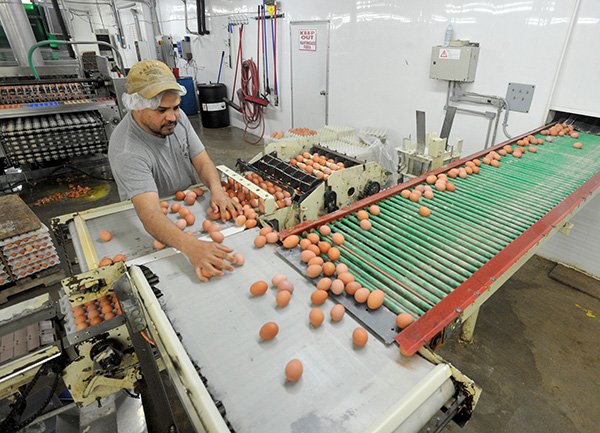Congress expects to pass a new farm bill this year and local organic farmers hope it grants them more funding.
The farm bill covers most federal government polices related to agriculture in the United States and is typically renewed every five years. The bill covers a variety of agriculture, conservation, rural development, research and food assistance policies.
The Senate Agriculture Committee plans to begin negotiating the farm bill next month.
The 2008 farm bill expired in 2012, but an extension carries the bill through September.
Congress added policies about organic agriculture to the 2008 farm bill.
Funding for organic farming is lumped together with horticulture, agricultural trade programs and supplemental disaster assistance in the 2008 bill. The Congressional Budget Office projects the group was slated to receive $7.1 billion, a small piece of the overall pie.
The budget office predicts farm bill spending will be $636.2 billion between 2008-17.
Eric Wailes, professor of agricultural economics at the University of Arkansas, doesn’t anticipate any big changes in its funding in the next farm bill.
“Organic production systems are relatively new. It’s small but growing,” Wailes said. “It could change eventually and get more funding.”
Michael Cox hopes to see a change. He is president of Arkansas Egg Co. in rural Washington County and hopes to double the size of his business in the next couple years.
Arkansas Egg Co. produces 100 percent organic eggs and grew from a $5 million to $25 million business. In the past five years, the company grew from 20 to 60 jobs.
Cox has 11 chicken houses on site at the Arkansas Egg Co. and uses 50 family farms to supply organic eggs to the business.
Sen. John Boozman, R-Ark., visited the business earlier this week to discuss farm bill concerns. The Republican senator is a member of the Senate Agriculture Committee.
“Agriculture is such a major part of the state’s economy,” he said. “The key is getting a bill that meets the different needs of all producers.”
It’s important his colleagues are educated on poultry and organic issues to keep regulations in check and research funding available, Boozman said.
“Everybody is disappointed we didn’t reach an agreement last year,” he said. “We are committed to pass a new farm bill.”
Versions of the 2012 farm bill made it through a House committee and the Senate last year, but the House did not vote on a bill.
Boozman and Sen. Mark Pryor, D-Ark., both voted against last year’s Senate bill but said a new bill should pass this year.
Pryor is cautiously optimistic Congress will pass a new farm will this year, said Michael Teague, a spokesman for Arkansas’ Democratic senator.
Pryor sits on the Senate’s agriculture appropriations subcommittee.
“We are in a good position to help Arkansas farmers,” Teague said.
Ashley Swaffar, operations manager for Arkansas Egg Co., said she wants to see the farm bill create an organic checkoff. A checkoff is an industry-funded marketing and research program designed to increase domestic and international demand for an agricultural commodity.
“We need the language fixed to define organic as a commodity,” she said.
Wailes said checkoff funding has been very valuable in research in the state.
“It plays a key role in helping fund programs that address issues and problems that are unique to Arkansas farmers,” he said.
At A Glance
What Are Organic Eggs?
To be considered and organic egg, it must come from a laying hen not raised in a cage and with access to the outdoors. Chickens must be fed organic feed and not be given antibiotics, except during an infectious outbreak. Only natural molting can occur within the flock.
Source: U.S. Department Of Agriculture
The Organic Trade Association laid out a framework of organic farming policies it wants adopted in the new bill, which would see funding increase from $12 million in 2014 to $20.7 million in 2017.
The association points to the industry’s growth as a reason the growing money is needed.
The organic sector is creating jobs at four times the national rate, is a $29 billion industry in the United States and includes more than 14,500 organic family farms, according to the group’s research.
Among the group’s farm bill priorities are oversight of organic standards, providing research and market information to farmers, offsetting costs of organic certification for small businesses and providing risk management tools designed for the organic sector.
The U.S. Department of Agriculture’s competitive grants program helps fund programs dedicated to organic research ranging from improving weed management to enhancing environmental sustainability.
A national organic certification cost-share program would help certified organic farmers and handlers offset costs of certification by providing a small reimbursement of no more than $750 a year. The Organic Trade Association reports the program works hand-in-hand with President Barack Obama’s Job Act by supporting small- and medium-size businesses. The group is requesting $30 million for the program during the life of the new farm bill.
Organic farms are good options for small farmers because producers are able to demand more money for their product.
Cox said the Arkansas Egg Co. uses small farmers who can reduce their bird count by up to 75 percent if they follow guidelines to maximize output.
“We see organic becoming an ever-present opportunity,” he said.


